Bethesda Softworks LLC is an American video game publisher based in Rockville, Maryland. The company was founded by Christopher Weaver in 1986 as a division of Media Technology Limited. In 1999, it became a subsidiary of ZeniMax Media. In its first 15 years, it was a video game developer and self-published its titles. In 2001, Bethesda spun off its in-house development team into Bethesda Game Studios, leaving Bethesda Softworks to focus on publishing operations.
Madden NFL is an American football sports video game series developed by EA Tiburon for EA Sports. The franchise, named after Pro Football Hall of Fame coach and commentator John Madden, has sold more than 130 million copies as of 2018. Since 2004, it has been the only officially licensed National Football League (NFL) video game series, and has influenced many players and coaches of the physical sport. Among the series' features are detailed playbooks and player statistics and voice commentary in the style of a real NFL television broadcast. As of 2013 the franchise has generated over $4 billion in sales, making it one of the most profitable video game franchises on the market.
A sports video game is a video game that simulates the practice of sports. Most sports have been recreated with video games, including team sports, track and field, extreme sports, and combat sports. Some games emphasize playing the sport, whilst others emphasize strategy and sport management. Some, such as Need for Speed, Arch Rivals and Punch-Out!!, satirize the sport for comic effect. This genre has been popular throughout the history of video games and is competitive, just like real-world sports. A number of game series feature the names and characteristics of real teams and players, and are updated annually to reflect real-world changes. The sports genre is one of the oldest genres in gaming history.

One on One: Dr. J vs. Larry Bird, commonly known as One on One, is a basketball video game written by Eric Hammond for the Apple II and published by Electronic Arts in 1983. It was initially ported to the Atari 8-bit family, ColecoVision, Commodore 64, and IBM PC. Versions followed for the TRS-80 Color Computer, Macintosh, Amiga, and ZX Spectrum. In Europe, the publisher was Ariolasoft. Atari Corporation released an Atari 7800 port in 1987.

FIFA International Soccer is a 1993 association football video game developed by EA Canada's Extended Play Productions team and published by Electronic Arts. The game was released for the Sega Mega Drive/Genesis console in December 1993 and ported to numerous other systems in 1994. It is the first game in the FIFA series.

Earl Weaver Baseball is a baseball video game (1987) designed by Don Daglow and Eddie Dombrower and published by Electronic Arts. The artificial intelligence for the computer manager was provided by Baseball Hall of Fame member Earl Weaver, then manager of the Baltimore Orioles, based on a lengthy series of interviews. EWB was a major hit, and along with John Madden Football helped pave the way for the EA Sports brand, which launched in 1992. A Sega Genesis version was planned but cancelled.

John Madden Football is a football video game originally released for the Apple II, in 1988 following the success of Earl Weaver Baseball. It was later ported to MS-DOS and the Commodore 64. It was followed by the 1990 Sega Genesis video game of same name, and went on to become the yearly Madden NFL game series. It is sometimes called Madden '88 or Madden '89 to distinguish it from later games in the series.
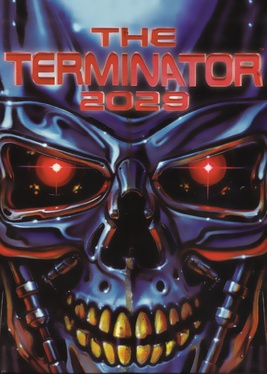
The Terminator 2029 is a first-person shooter video game developed and published by Bethesda Softworks. It is based on the Terminator film series, and was released in 1992 for DOS. It is Bethesda's second Terminator game following The Terminator (1991).
ZeniMax Media Inc. is an American video game holding company based in Rockville, Maryland, and founded in 1999.

Sword of Sodan is a hack and slash video game released for the Amiga in 1988 by Discovery Software, which also commissioned a port for the Apple IIGS. A scaled-down version for the Sega Genesis was released in 1990 by Electronic Arts, and in 1993 it was released for the Apple Macintosh System 7 by Bethesda Softworks.

Escape from Singe's Castle, also known as Dragon's Lair Part II - Escape From Singe's Castle, is a 1987 video game from Software Projects. The game is sometimes referred to as Dragon's Lair II, but is not the official arcade sequel Dragon's Lair II: Time Warp.

Falcon is a combat flight simulator video game and the first official entry in the Falcon series of the F-16 jet fighter's simulators by Spectrum HoloByte. Originally developed by Sphere for Macintosh and MS-DOS in 1987 and ported to several platforms between 1988 and 1992, the game earned commercial success and critical acclaim.
Christopher S. Weaver is an American entrepreneur, software developer, scientist, author, and educator. He is known for founding Bethesda Softworks, where he was one of the creators of The Elder Scrolls role-playing series.

Video gaming in the United States is one of the fastest-growing entertainment industries in the country. The American video game industry is the largest video game industry in the world. According to a 2020 study released by the Entertainment Software Association, the yearly economic output of the American video game industry in 2019 was $90.3 billion, supporting over 429,000 American jobs. With an average yearly salary of about $121,000, the latter figure includes over 143,000 individuals who are directly employed by the video game business. Additionally, activities connected to the video game business generate $12.6 billion in federal, state, and local taxes each year. World Economic Forum estimates that by 2025 the American gaming industry will reach $42.3 billion while worldwide gaming industry will possibly reach US$270 billion. The United States is one of the nations with the largest influence in the video game industry, with video games representing a significant part of its economy.
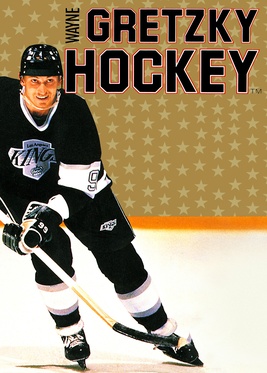
Wayne Gretzky Hockey is an ice hockey-themed sports game developed by Bethesda Softworks, and first published in 1988.
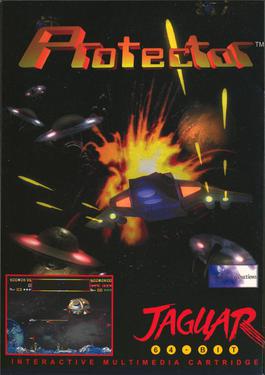
Protector is a horizontally scrolling shooter developed by Bethesda Softworks and published by Songbird Productions for the Atari Jaguar on November 27, 1999. It is based on Søren Grønbech's 1989 Amiga game Datastorm, which in turn it was inspired by both Defender and Dropzone.
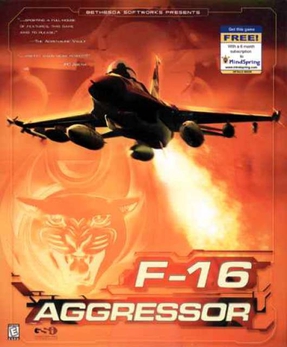
F-16 Aggressor is a video game developed by General Simulations Incorporated and published by Bethesda Softworks in 1998-1999.
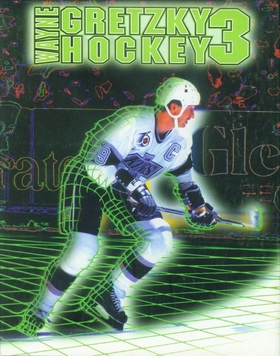
Wayne Gretzky Hockey 3 is a 1992 ice hockey-themed sports game developed and published by Bethesda Softworks.













